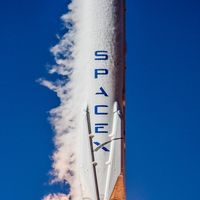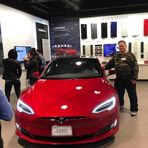Tesla's Turbulent Times: A Perfect Storm of Challenges
March 12, 2025, 3:48 pm

Location: United States, Kansas, Winfield
Employees: 1001-5000
Founded date: 2011
Total raised: $820K

Location: United States, District of Columbia, Washington
Employees: 5001-10000
Founded date: 2002
Total raised: $7.53B

Location: United States, Texas, Austin
Employees: 10001+
Founded date: 2003
Total raised: $3.86B
Tesla is in a tailspin. The electric vehicle giant has seen its stock plummet 15% in a single day, marking its steepest decline in five years. This is not just a blip; it’s a seismic shift. The company has lost over half its value since its peak in December 2024, erasing around $800 billion in market capitalization. The electric vehicle market is evolving, but Tesla seems to be caught in a storm.
The troubles began when CEO Elon Musk took on a significant role in the Trump administration. Since then, Tesla's stock has been on a downward trajectory, losing value week after week. The last seven weeks have been particularly brutal, with the company facing its longest losing streak since it went public in 2010. Investors are feeling the heat, and the market is reacting with a vengeance.
Musk's dual role as a business leader and a government official is raising eyebrows. He claims to be managing both “with great difficulty.” His focus on the Department of Government Efficiency, aimed at slashing federal spending and workforce, has drawn criticism. As he juggles these responsibilities, Tesla's performance is suffering. The company is not just facing stock declines; it’s also dealing with brand erosion. Musk's controversial political rhetoric is alienating fans and customers alike.
The fallout is evident. Tesla's sales in Europe have plummeted by 50% year-over-year. Analysts are pointing fingers at Musk's political entanglements and the growing distaste for the brand. As the electric vehicle market expands, Tesla is losing ground to competitors. Other brands are gaining traction, while Tesla's Model Y, despite being the best-selling electric vehicle globally, is not immune to the shifting tides.
The uncertainty surrounding tariffs is another storm cloud on the horizon. With potential trade wars looming, the automotive supply chain is at risk. Canada and Mexico are key markets for Tesla, and increased tariffs could lead to higher production costs. This uncertainty is making investors jittery. The market is reacting not just to Tesla's performance but to the broader implications of Musk's political role.
Vandalism and protests are adding fuel to the fire. Tesla facilities have become targets for activists disillusioned by Musk's actions. Reports of arson attempts and vandalism at Tesla locations are concerning. Analysts warn that such incidents could deter potential buyers. If customers fear for their vehicles' safety, they may think twice before purchasing a Tesla.
Musk's response to these challenges has been mixed. He remains optimistic, claiming that “it will be fine long-term.” However, this sentiment is not shared by all. Investors are growing wary. Some are questioning Musk's ability to lead effectively while juggling multiple high-stakes roles. The chaos surrounding his other ventures, like SpaceX and the social media platform X, is compounding the issue. Outages on X have raised eyebrows, and Musk's claims of cyberattacks lack substantiation.
In the midst of this turmoil, some investors are holding firm. Billionaire Ron Baron, a long-time supporter of Tesla, has vowed not to sell his shares. He believes the current prices are a bargain and anticipates significant returns in the long run. His confidence contrasts sharply with the broader market sentiment. While some see opportunity, others see a sinking ship.
The electric vehicle market is evolving rapidly. Global sales of electric vehicles, including hybrids, rose by 21% in January. Yet, Tesla's sales are declining. Competitors are stepping up their game, and Tesla is losing its edge. The landscape is shifting, and the company must adapt quickly to survive.
Musk's political involvement is a double-edged sword. While he aims to streamline government operations, his visibility in the political arena is raising questions about his commitment to Tesla. Investors are concerned that his focus on government efficiency may come at the expense of his businesses. The balance between his roles is precarious, and the consequences are evident in Tesla's stock performance.
As the electric vehicle market continues to grow, Tesla must navigate these turbulent waters. The company faces challenges on multiple fronts: declining sales, brand erosion, and political entanglements. The perfect storm is brewing, and how Tesla responds will determine its future.
In conclusion, Tesla is at a crossroads. The company must confront its challenges head-on. The road ahead is fraught with obstacles, but with strategic navigation, it can emerge stronger. Investors are watching closely. The stakes are high, and the outcome remains uncertain. Tesla's journey is far from over, but the path is rocky. The electric vehicle revolution is here, and Tesla must find its footing in this new landscape.
The troubles began when CEO Elon Musk took on a significant role in the Trump administration. Since then, Tesla's stock has been on a downward trajectory, losing value week after week. The last seven weeks have been particularly brutal, with the company facing its longest losing streak since it went public in 2010. Investors are feeling the heat, and the market is reacting with a vengeance.
Musk's dual role as a business leader and a government official is raising eyebrows. He claims to be managing both “with great difficulty.” His focus on the Department of Government Efficiency, aimed at slashing federal spending and workforce, has drawn criticism. As he juggles these responsibilities, Tesla's performance is suffering. The company is not just facing stock declines; it’s also dealing with brand erosion. Musk's controversial political rhetoric is alienating fans and customers alike.
The fallout is evident. Tesla's sales in Europe have plummeted by 50% year-over-year. Analysts are pointing fingers at Musk's political entanglements and the growing distaste for the brand. As the electric vehicle market expands, Tesla is losing ground to competitors. Other brands are gaining traction, while Tesla's Model Y, despite being the best-selling electric vehicle globally, is not immune to the shifting tides.
The uncertainty surrounding tariffs is another storm cloud on the horizon. With potential trade wars looming, the automotive supply chain is at risk. Canada and Mexico are key markets for Tesla, and increased tariffs could lead to higher production costs. This uncertainty is making investors jittery. The market is reacting not just to Tesla's performance but to the broader implications of Musk's political role.
Vandalism and protests are adding fuel to the fire. Tesla facilities have become targets for activists disillusioned by Musk's actions. Reports of arson attempts and vandalism at Tesla locations are concerning. Analysts warn that such incidents could deter potential buyers. If customers fear for their vehicles' safety, they may think twice before purchasing a Tesla.
Musk's response to these challenges has been mixed. He remains optimistic, claiming that “it will be fine long-term.” However, this sentiment is not shared by all. Investors are growing wary. Some are questioning Musk's ability to lead effectively while juggling multiple high-stakes roles. The chaos surrounding his other ventures, like SpaceX and the social media platform X, is compounding the issue. Outages on X have raised eyebrows, and Musk's claims of cyberattacks lack substantiation.
In the midst of this turmoil, some investors are holding firm. Billionaire Ron Baron, a long-time supporter of Tesla, has vowed not to sell his shares. He believes the current prices are a bargain and anticipates significant returns in the long run. His confidence contrasts sharply with the broader market sentiment. While some see opportunity, others see a sinking ship.
The electric vehicle market is evolving rapidly. Global sales of electric vehicles, including hybrids, rose by 21% in January. Yet, Tesla's sales are declining. Competitors are stepping up their game, and Tesla is losing its edge. The landscape is shifting, and the company must adapt quickly to survive.
Musk's political involvement is a double-edged sword. While he aims to streamline government operations, his visibility in the political arena is raising questions about his commitment to Tesla. Investors are concerned that his focus on government efficiency may come at the expense of his businesses. The balance between his roles is precarious, and the consequences are evident in Tesla's stock performance.
As the electric vehicle market continues to grow, Tesla must navigate these turbulent waters. The company faces challenges on multiple fronts: declining sales, brand erosion, and political entanglements. The perfect storm is brewing, and how Tesla responds will determine its future.
In conclusion, Tesla is at a crossroads. The company must confront its challenges head-on. The road ahead is fraught with obstacles, but with strategic navigation, it can emerge stronger. Investors are watching closely. The stakes are high, and the outcome remains uncertain. Tesla's journey is far from over, but the path is rocky. The electric vehicle revolution is here, and Tesla must find its footing in this new landscape.